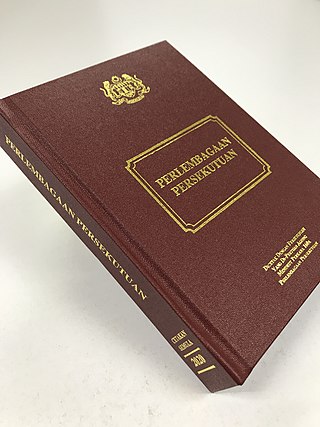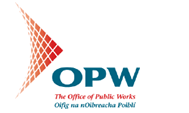
The Federal Constitution of Malaysia, which came into force in 1957 as the Constitution of the Federation of Malaya and was amended in 1963 to form the Constitution of Malaysia, is the supreme law of Malaysia and contains a total of 183 articles. It is a written legal document influenced by two previous documents, the Federation of Malaya Agreement 1948 and the Independence Constitution of 1957. The Federation was initially called the Federation of Malaya and it adopted its present name, Malaysia, when the states of Sabah, Sarawak and Singapore became part of the Federation. The Constitution establishes the Federation as a constitutional monarchy, having the Yang di-Pertuan Agong as the Head of State with largely ceremonial roles. It provides for the establishment and organisation of three main branches of the government: the bicameral legislative branch called the Parliament, which consists of the House of Representatives and the Senate ; the executive branch led by the Prime Minister and his Cabinet Ministers and the judicial branch headed by the Federal Court.

The Office of Public Works (OPW) is a major Irish Government agency, which manages most of the Irish State's property portfolio, including hundreds of owned and rented Government offices and police properties, oversees National Monuments and directly manages some heritage properties, and is the lead State engineering agency, with a special focus on flood risk management. It lies within the remit of the Minister for Public Expenditure, National Development Plan Delivery and Reform, with functions largely delegated to a Minister of State at the Department of Public Expenditure, National Development Plan Delivery and Reform with special responsibility for the Office. The OPW has a central role in driving the Government's property asset management reform process, both in respect of its own portfolio and that of the wider public service. The agency was initially known as Board of Works, a title inherited from a preceding body, and this term is still sometimes encountered.

The Government of Singapore is defined by the Constitution of the Republic of Singapore to consist of the President and the Executive. Executive authority of Singapore is vested in the President but exercised on the advice of the Cabinet led by the Prime Minister. The President, acting as the Head of State, may only act in their discretion in appointing the Prime Minister, acting as the Head of Government; as well as withholding consent for the dissolution of Parliament; along with performing key checks on the Government in addition to the ceremonial duties of the Head of State inherited from the Westminster system. The Cabinet, consisting of the Prime Minister and ministers appointed by the President on the Prime Minister's advice, is responsible for heading the Executive through ministries and other statutory boards. At the end of the term or at any time during the term, once the President has consented to a request made by the Prime Minister to dissolve Parliament, Parliamentary General Elections are held to elect members of Parliament for a new term. The President, in their discretion, then appoints a Prime Minister who is a member of Parliament representing any political party or coalition of political parties who in their judgement is likely to command the confidence of the majority of the members of Parliament. The Prime Minister then forms the Government and, along with the Cabinet, sets the general direction and control of the Government for the next term.

His Majesty's principal secretaries of state, or secretaries of state, are senior ministers of the Crown in the Government of the United Kingdom. Secretaries of state head most major government departments and make up the majority of the Cabinet of the United Kingdom.

The Malaysian Maritime Enforcement Agency Act 2004 is an act to establish the Malaysian Maritime Enforcement Agency to perform enforcement functions for ensuring the safety and security of the Malaysia Maritime Zone with a view to the protection of maritime and other national interests in that zone. It came into force on 15 February 2005.

The Pensions Act 2004 is an Act of the Parliament of the United Kingdom to improve the running of pension schemes.
Industrial design rights in the European Union are provided at both the Union level by virtue of the Community design and at the national level under individual national laws.

A trademark is a type of intellectual property consisting of a recognizable sign, design, or expression that identifies a product or service from a particular source and distinguishes it from others. A trademark owner can be an individual, business organization, or any legal entity. A trademark may be located on a package, a label, a voucher, or on the product itself. Trademarks used to identify services are sometimes called service marks.
Municipal or local governance refers to the third tier of governance in India, at the level of the municipality or urban local body.
A municipal corporation is a type of local government in India which administers urban areas with a population of more than one million. The growing population and urbanization of various Indian cities highlighted the need for a type of local governing body that could provide services such as healthcare, education, housing and transport by collecting property taxes and administering grants from the state government.

The Coal Industry Nationalisation Act 1946 was an Act of the Parliament of the United Kingdom which nationalised, or brought into state control, the coal industry in the United Kingdom. It established the National Coal Board as the managing authority for coal mining and coal processing activities. It also initially provided for the establishment of consumers' councils. The Coal Industry Nationalisation Act 1946 was the first of a number of Acts promulgated by the post-war Labour government to nationalise elements of the UK's industrial infrastructure; other Acts include the Electricity Act 1947; the Transport Act 1947 ; the Gas Act 1948; and the Iron and Steel Act 1949.

The Police Act 1967 is the Act of Parliament governing which governs the constitution, control, employment, recruitment, funds, discipline, duties, and powers of the Royal Malaysia Police including Royal Malaysia Police Reserve and the Royal Malaysia Police Cadet Corps. It was first enacted in 1967 and then revised in 1988 as Act 344 of 1988. To date, there have been several attempts of amendments for the Police Act to be more in line with the internationally accepted human rights practices.
The basic law of copyright in Malaysia is under the Copyright Act 1987 which came into force on 1 December 1987. The law has undergone various significant updates since then, with amendments to the Act taking effect in 1990, 1999, 2000 and 2003.

The Ministry of Domestic Trade and Costs of Living, abbreviated KPDN, is a ministry of the Government of Malaysia that is responsible for domestic trade, living costs, co-operatives, consumerism, franchise and others.
Donaldson & Burkinshaw is the oldest independent law partnership in Singapore. It was established on 6 November 1874. Today, the firm is a medium-sized, full-service law practice.

The Department for Business, Energy, and Industrial Strategy (BEIS) was a ministerial department of the United Kingdom Government, from July 2016 to February 2023.

The Armed Forces Act 1972 [Act 77), is a Malaysian laws which enacted to amend and consolidate the law relating to the establishment, government and discipline of the armed forces of Malaysia.

The Bankruptcy Act 1967, is a Malaysian laws which enacted relating to the law of bankruptcy.

The Financial Services Act 2013, is a Malaysian laws which enacted to provide for the regulation and supervision of financial institutions, payment systems and other relevant entities and the oversight of the money market and foreign exchange market to promote financial stability and for related, consequential or incidental matters.

The Oil and Pipelines Act 1985 is an Act of the Parliament of the United Kingdom which established the Oil and Pipelines Agency to buy, sell or deal in petroleum and to manage on behalf of the Crown petroleum pipelines and storage installations. The act abolished the British National Oil Corporation and transferred its assets to the Agency.











